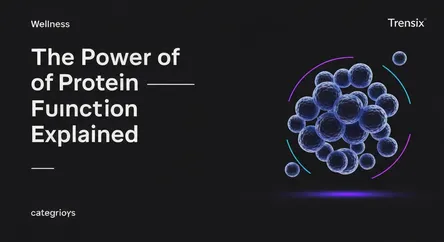Wellness
The Power of Protein Function Explained

Discover the vital roles protein plays in your body, from building muscle and boosting immunity to aiding in weight management.
What is it?
Proteins are essential macromolecules, often called the body's "building blocks," composed of smaller units known as amino acids. They are fundamental to virtually every process within cells. The function of a protein is determined by its specific sequence of amino acids. These molecules perform a vast array of tasks, including catalyzing metabolic reactions as enzymes, providing structural support to cells and tissues (like collagen), and transporting other molecules. They also play a critical role in the immune system as antibodies and help coordinate bodily functions as hormones.
Why is it trending?
The importance of protein function has become a major trend in health and wellness, moving from niche bodybuilding communities to mainstream awareness. This surge is fueled by the popularity of high-protein diets like Paleo and Keto, which emphasize protein for weight management and satiety. There is a growing consumer focus on protein's role in building lean muscle, managing hunger, and maintaining energy levels. The "plant-based" movement has also broadened the conversation, introducing a wider variety of protein sources to health-conscious individuals.
How does it affect people?
Protein function directly impacts physical health, fitness, and overall well-being. Consuming adequate protein is crucial for repairing muscle fibers that tear during exercise, which leads to muscle growth and increased strength. It supports a healthy immune system by creating antibodies that fight infection. Furthermore, protein has a higher thermic effect than carbs or fats, meaning your body burns more calories digesting it, which can aid in weight management. A diet sufficient in protein helps maintain bone health, transports nutrients, and is essential for producing hormones and enzymes that regulate the body.